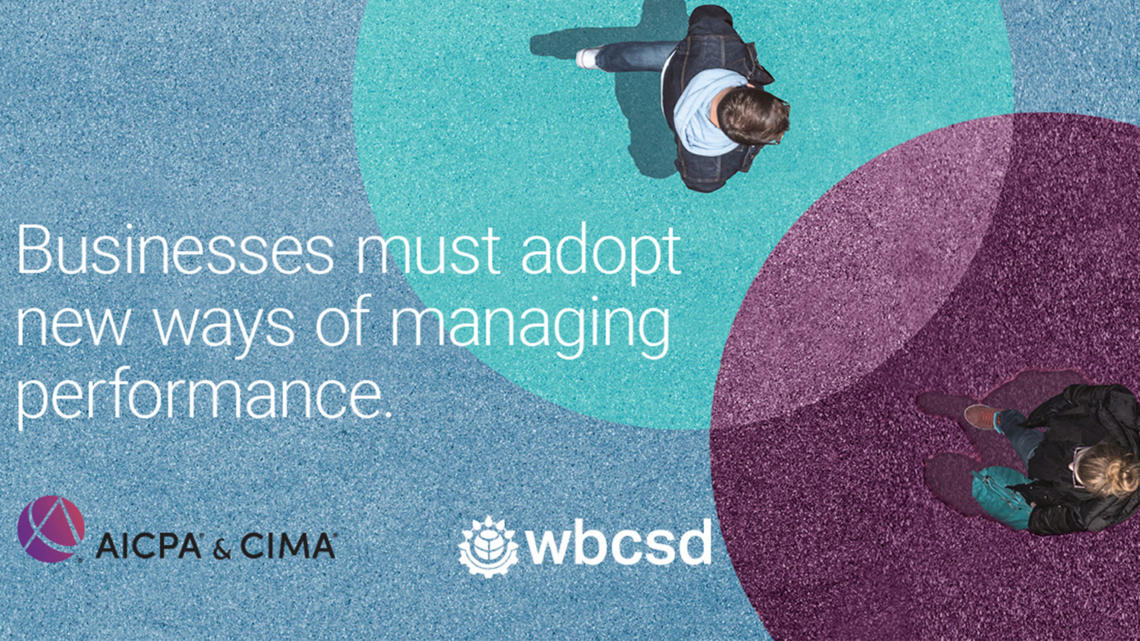22 September 2021, London/Geneva – As the drive toward the digitalization of the economy continues to accelerate, businesses must look beyond traditional ways of managing performance to become more responsive and build their resilience according to a new report from the Association of International Certified Professional Accountants (the Association), representing the American Institute of CPAs (AICPA) and The Chartered Institute of Management Accountants (CIMA), and the World Business Council for Sustainable Development (WBCSD).
To win in the post-pandemic world, businesses must adopt new ways of managing performance that simultaneously build on the talents of their people, leverage their business model, systems, processes and procedures, and actively engage with stakeholders. Yet, the Reimagining Performance Management report also reveals that creating the performance-based corporate culture needed to support this shift, drive innovation, create value and move the business forward remains a challenge for many organizations.
AICPA & CIMA conducted initial interviews with 42 finance, HR, and operational leaders at 32 companies including HSBC, Coca-Cola, Diageo, AstraZeneca, Nestlé, Nike and Unilever. It was followed by a series of roundtables with 34 finance, HR, and operational leaders at 34 companies across the USA, the UK, South Africa, Singapore, and Brazil. The report identified seven key good practices that businesses should adopt and implement to drive better business performance:
- Creating “one version of the truth” clear line of sight between activities and strategy to help employees develop ownership and accountability;
- Factoring in relevant externalities, such as environmental and social impact, into business values and day-to day decision-making to attract and retain talent;
- Engaging employees with developing and refining business strategies to meet strategic objectives;
- Combining responsibilities for both strategic goals and functional excellence to sharpen performance;
- Improving cooperation and coordination across functional silos to optimise decision-making and resource allocation;
- Aligning personal objectives and incentives with organizational strategy at all levels of the business;
- Connecting external information and internal information with financial outcomes to ensure effective decision making.
Andrew Harding, FCMA, CGMA, Chief Executive – Management Accounting at the Association of International Certified Professional Accountants, representing AICPA & CIMA, said:
“If the pandemic has taught us anything, it’s that the ways we manage businesses today should be different from the ways we managed them in the past. In our ever-changing and complex environment, businesses can no longer solely focus on financial data to assess their performance, drive long-term strategies and generate sustainable value.
“However, to create more resilient, well-run and innovative businesses that can measure performance in meaningful ways, it’s imperative that businesses connect the dots within their organization. They must effectively engage their employees in strategy conversations, create a culture of performance and accountability, and allocate resources in ways that ensure efficient and effective execution of the business strategy. People will be the key to business success.”
Peter Bakker, President & CEO at WBCSD, said:
“Business as usual is no longer possible if we want businesses to thrive and play a lead role in solving the problems of climate change, biodiversity loss and inequality. These are connected and complex existential problems that require innovative and fresh thinking. Redefining what we mean by corporate performance, what we measure and what we manage are critical to that transformation.
“Much attention has been given to external reporting to stakeholders but for that to be meaningful, management accounting needs to change so that it is not based on models that externalize costs leaving communities and the environment to pick up the bill. Successful businesses need to create value for all stakeholders not just a few. Increasingly forward-thinking businesses have already started to transition and it’s time for management accountants to step up and provide the information needed for sound and effective decision-making.”
Later this year, AICPA & CIMA and WBSCD will launch a second phase of the Reimagining Performance Management research. This phase will dive further into the good integrated performance management practices identified in phase 1, and focus on developing and testing their practical application to real-life business challenges.
The full Reimagining Performance Management report is available here.








